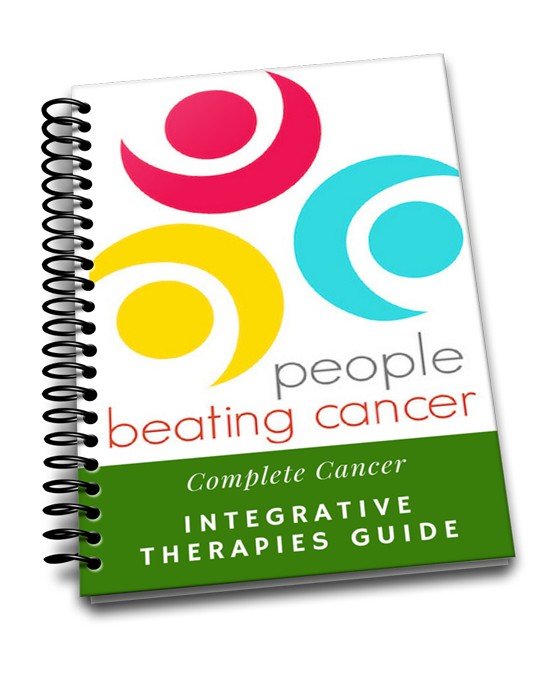- You are here:
- Home »
- Blog »
- Healthy Living Products »
- Thyroid, Kidney and Liver Cancer- Toxic/Non-Toxic Angiogenesis Inhibitors
Thyroid, Kidney and Liver Cancer- Toxic/Non-Toxic Angiogenesis Inhibitors

Sorafenib (co-developed as Nexavar),[1] is a kinase inhibitor drug approved for the treatment of primary kidney cancer (advanced renal cell carcinoma), advanced primary liver cancer (hepatocellular carcinoma), and radioactive iodine resistant advanced thyroid carcinoma.
The article linked and excerpted below quotes several oncologists making the case for anti-angiogenic chemotherapy drugs such as Sorafenib (co-developed as Nexavar), a potent angiogenesis inhibitor. Unfortunately, Nexavar is expensive, causes a long list of side effects and will stop working eventually. Consider both conventional and non-conventional liver cancer therapies.
What if you could add non-toxic anti-angiogenic therapies to your regimen? This idea isn’t radical or even that new. There is a great deal of research that establishes the anti-angiogenic (and anti-cancer) properties of curcumin for example. When I happened on Dr. Bill Li’s Ted Talk in 2010 a whole new world opened up to me.
Among other non-toxic anti-angiogenic therapies that I follow daily, weekly, etc. I supplement with Life Extension Super Bio-Curcumin and have been since about 2006. And my incurable blood cancer has remained in complete remission in all that time. I chose to take LE Super Bio-Curcumin because of it’s efficacy and because it has been evaluated and approved by Consumerlab.com, an independent testing organization.
Research indicates that Curcumin enhances the efficacy of Nexavar in liver cancer.
“In particular, in BEL-7402 cells induced tumor xenograft, SCN treatment displayed the obviously enhanced inhibitory effect on tumor progression over free drug monotherapy or their physical mixture, with significantly increased antiproliferation and antiangiogenesis capability. Thereby, the codelivered nanoassemblies of sorafenib and curcumin provided a promising strategy to enhance the combinational therapy of HCC…”
I am both a long term cancer survivor and cancer coach. If you have been diagnosed with colorectal cancer consider both conventional (FDA approved) and evidence-based non-conventional anti-angiogenic therapies.
Thank you,
David Emerson
- Cancer Survivor
- Cancer Coach
- Director PeopleBeatingCancer
Angiogenesis inhibitor
“An angiogenesis inhibitor is a substance that inhibits the growth of new blood vessels (angiogenesis). Some angiogenesis inhibitors are endogenous and a normal part of the body’s control and others are obtained exogenously through pharmaceutical drugs or diet.
Angiogenesis inhibitors were once thought to have potential as a “silver bullet” treatment applicable to many types of cancer, but the limitations of anti-angiogenic therapy have been shown in practice.[1]”
Sorafenib
Sorafenib (co-developed as Nexavar),[1] is a kinase inhibitor drug approved for the treatment of primary kidney cancer (advanced renal cell carcinoma), advanced primary liver cancer (hepatocellular carcinoma), and radioactive iodine resistant advanced thyroid carcinoma…”
What Are Anti-Angiogenesis Drugs to Treat Cancer?
“Oncologists have a variety of medicines they can use to treat cancer. Each drug works in a different way, so doctors often give patients different types of drug at the same time to deliver a one-two blow to tumors. One type of drug used in metastatic cancer helps prevent the development of new blood vessels that feed tumors, a process called angiogenesis…
What Is Angiogenesis?
Angiogenesis is a normally balanced, biological process whereby our body develops new blood vessels as needed to deliver nutrients and oxygen and to eliminate metabolic waste and carbon dioxide. In cancer, however, tumors hijack this process for their own benefit.
“Angiogenesis happens during cancer formation, growth and – most importantly – spread,” says Dr. Davendra Sohal, an oncologist at the Cleveland Clinic. “Tumors need a blood supply to grow so they require new blood vessels. The native blood supply is insufficient, so angiogenesis is stimulated by the cancer itself for its own growth.”
Anti-angiogenesis medicines help control the process of new blood vessel development, Sohal says. They choke the blood supply to the cancer, preventing it from getting blood and nutrients…
[These drugs] don’t work for everyone,” Landau says. They work well in certain cancers, but not in others (for example, breast cancer). They can also wear off as time goes on. In the case of kidney cancers, Landau says, once you block one pathway for developing blood vessels, the tumor learns to develop others…Chemotherapy and anti-angiogenesis drugs can’t cure metastatic cancer or prevent recurrence; they can only help prolong survival. “Cancer is a smart animal,” Sohal says. “It can find ways to fight back.” When patients develop resistance to chemotherapy, it’s time to change to a different chemotherapy drug, he says. “We’ll continue to use angiogenesis drugs as long as we have another chemotherapy option. However, by themselves, anti-angiogenesis drugs don’t do a whole lot.”

